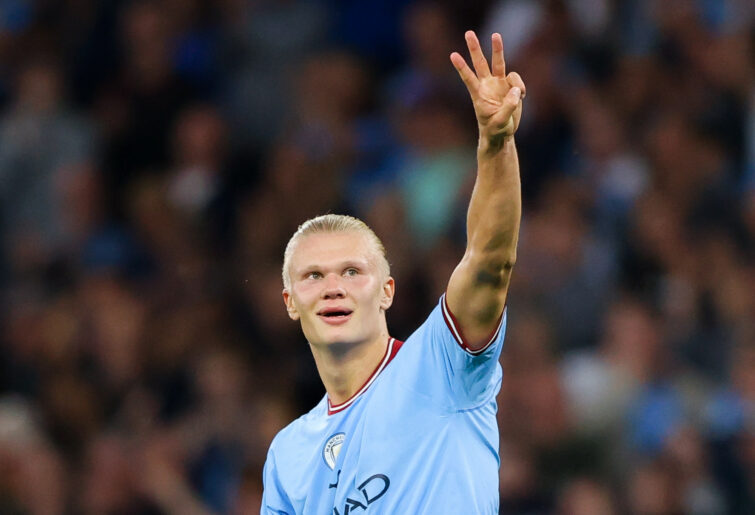Unreal goalkeeping, promotion winning goals and an AFC Cup win: Australians around the globe team of the week
Cameron Burgess scored the winner to confirm Ipswich’s status as a Premier League club.
Opinion
A few weeks before Christmas, as the days draw short and the winter drizzle begins to occupy an abject state of permanence across the UK, Manchester City will waltz into Kenilworth Road, home ground of newly promoted Luton Town.
Their fans, so used now to seeing their team play in the grey colosseum of the Etihad, the towering tiers of the Bernabéu or the juggernaut of Wembley, will amble along a staircase hovering above locals backyards before making it into the tiny, 10,000 capacity stadium.
Onto the field will step the likes of Erling Haaland, who in the next Premier League season will make £19 million, more than double that of the entire team he will be facing.
Jack Grealish will be there too, the most expensive British footballer in history, who that week will earn more money than most of the supporters present will ever see in their bank account at once.
This is not new, of course. Sport and money have been inexorably entwined for decades since athletes stopped working second jobs and clubs learned just how lucrative sponsorship and television deals were worth.
It is a given, right across the globe that when you turn up to watch your team in action, the players are earning money faster than you are losing it at the concession stands.
But something is changing in the Premier League. Changing faster than in any other sport, or in any of the other high-class football leagues across Europe and the rest of the world.
No longer content with billionaires being their primary benefactors, English clubs are being systematically swallowed by state-run corporations that hold so much power and capital that the Premier League themselves are becoming powerless to stop them.
2008, and Manchester City are watching their finances dwindle after their owners assets are frozen. They finish 9th in the league as crosstown rivals and English powerhouse Manchester United lift yet another title.

Erling Haaland (Photo by James Gill – Danehouse/Getty Images)
In swoops the Abu Dhabi United Group, who pinky-swear they have nothing to do with the government that definitely, probably don’t control their bank accounts.
Within months Manchester City have broken the British transfer record (£32.5 million, which today may get you a half-decent benchwarmer), and begun their dizzying climb to the top of the global footballing pyramid, capped off this year with a few weeks in May that saw them win the Premier League, Champions League, and FA Cup.
Newcastle United are the latest club to have begun their foray into the world of state-backed ownership. The Saudi Arabian Public Investment Fund, which is really another name for the “Treasury of the Government of Saudi Arabia”, are the new players on the scene. Perennially locked into the middle of the Premier League table, Newcastle surprised exactly no one when they qualified for the Champions League just two years after the takeover.
Taking nothing away from their sprightly manager Eddie Howe, this would have been close to impossible without their new financial sources that has seen their squad grow to a staggering £350 million group.
Perhaps this is the new norm. Manchester United are close to becoming a vassal of the Qatari state, and it’s not hard to imagine other clubs in England going the same way.
Perhaps there’s no room anymore for the Leicester of 2016 or the Brentford of 2023. How did it get to this? How has football, the world game, become so intrinsically linked to global financial systems that it’s very soul has been ripped out and left to rot?
Money is everything in football. Money makes the real problems fade into obscurity. Money hires the best lawyers in the world so that even teams with the most money can overrule laws that have clearly been broken by finding loopholes that can only be found by a team of lawyers big enough to fill Kenilworth Road getting paid enough money to find them.
Money can build stadiums in parts of London where two roads away the population are living far below the poverty line.
The acquisition of money is a never-ending, M.C Escher painting of cyclical habits where teams who are bought by oil states buy the best players in the world and win the best trophies in the world whereby they are awarded with yet more money so that they may do it all again next year.
When Manchester City step onto the ground at Kenilworth Road, there’s no guarantee that it will be a walkover. The Premier League is still one of the most competitive leagues in the world, famous for its upsets and close finishes. But it won’t matter, because the scoreline, the points, and the league table doesn’t really matter anymore.
The real business is done between June and August. The Premier League trades in levels of money that have become so hilariously large that a whole generation of fans have an entirely different idea of what £100 million means.
Sure, the money is spent to improve the quality of the club so that they can earn more points and finish higher in the table. But at the end of the day, everyone’s just fighting for the money.